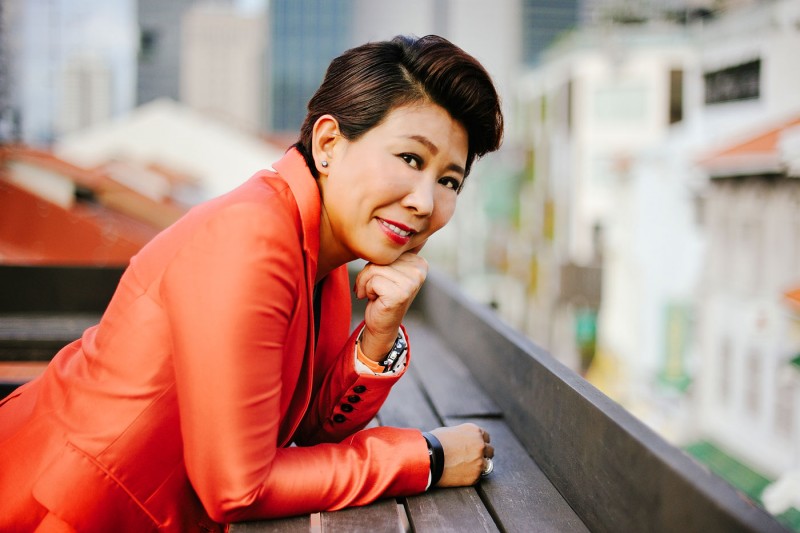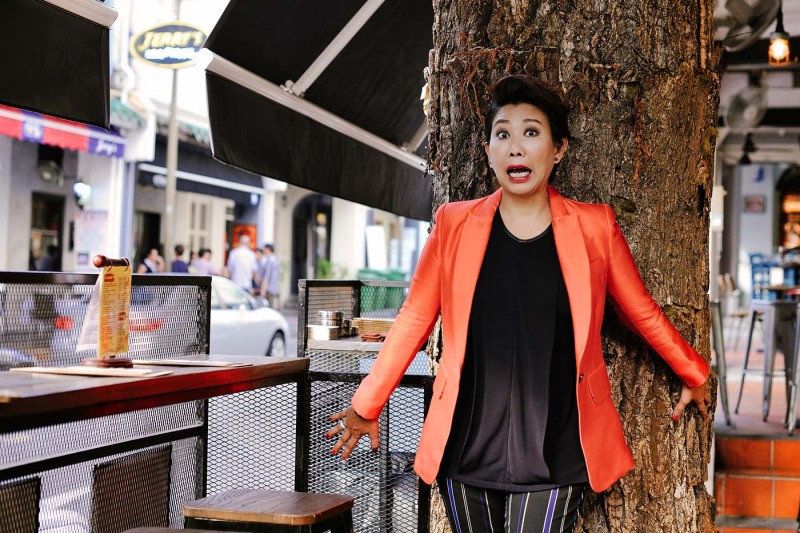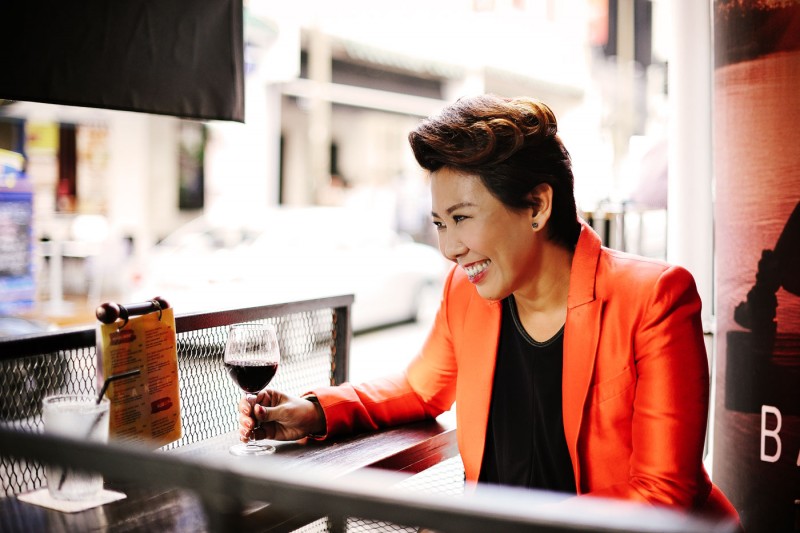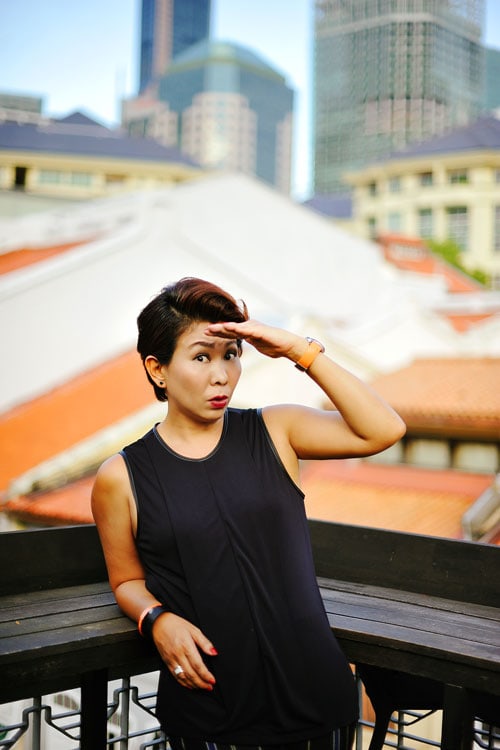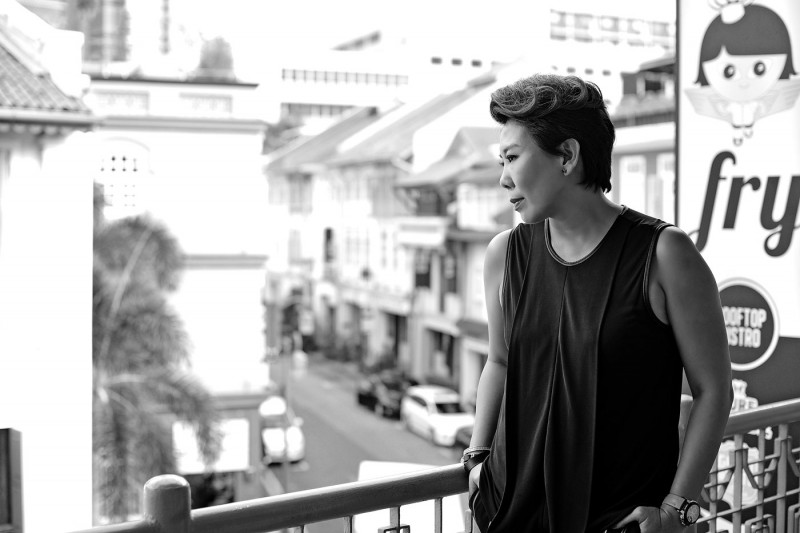I wanted to get a sense of who Irene Ang was prior to our meeting. Was there a chasm between her public and private persona? I needed an honest opinion without any sugar coating, so I texted Chelsea Scott-Blackhall. As it turns out, they are good friends. Here’s what transpired between the both of us: Me: How is Irene like? Chelsea: Very kind and driven. She has a different bedside manner, but ultimately a good person. Me: Ah, I see. Would you say that she’s real? Chelsea: She is. ON A LATE MONDAY AFTERNOON, Irene is sitting outside Bar Naked. Her head is tilted down; eyes glued to the phone. Unbeknownst to her, I am waiting to catch her at the right moment. She finally looks up, and we share a silent moment of eye contact. Her hair is well-styled with a tinge of brown and her face is fully made up – although carefully concealed, I see signs of weariness. She’s wearing an orange blazer, a dark loose-fitting sleeveless top, and pinstriped pants. Her wrist accessories are in a similar shade as the blazer – a colour she seems particularly fond of. Throughout the photo shoot, Irene does not appear to be loquacious. Occasionally, I would get a sneak peek into her unique brand of drollery as she makes jocular remarks about posing with her publicist and personal assistant. Wanting to break the ice, I ask her how did she start believing in her own talent. She answers in an uncomplacent tone: “My talent is a gift from god and I have never taken things for granted. I do doubt myself many times. After every gig, I will ask my manager if I spoke too fast, or if I was funny, or even too hyper.” Before entering showbiz, Irene had quite an illustrious sporting career. She was offered a fencing scholarship in France and even qualified to be a member of the Singapore Olympic selection squad. She recounts how fencing taught her valuable qualities, which have remained pivotal towards her business approach. “Through fencing, I learnt to have patience and the importance of having a solid foundation. In the early years of FLY Entertainment, I had offers to buy over my company, but I wanted to lay the right foundation.” The phone rings, and my follow-up question on the possibility of a public listing is put on hold. Irene takes the call, switching into a more affectionate voice. Kit Chan is on the line, and they talk about an event at Jem. “I’m open to that,” she says. “None of my family or friends thought that my company would last for 3 years. Today, we are almost 17 years old. It is easy to start something but keeping it afloat is completely different.” The entertainment industry is filled with fickle exigencies and it’s easy to lose oneself in a quest for fame and popularity. However, there isn’t a hint of ego or self-inflatedness on Irene’s side. As we converse more, it becomes increasingly apparent what kind of woman she is – one with a lot of heart and soul, driven with desire to change the industry. Through FLY Entertainment, she is putting her own stamp on the world by developing multi-faceted artistes and creating new opportunities for them. In Man Alone with Himself, Friedrich Nietzsche talks about Rousseau, “He is relieving himself as an individual, and thinks that he is seeking a cure that will directly benefit society, but that will also indirectly, and by means of society, benefit him too.” To me, Irene Ang is Rousseau. She has turned her personal sadness into jokes, and through her comedy she hopes to improve the state of affairs in Singapore by creating awareness and bringing joy to people.
Conversations with Irene Ang
WY-LENE YAP: How has your health been after the scare earlier this year?
IRENE ANG: My health has been good! Since I started exercising ten years ago, I have never felt better. However, I have been told by my doctor I am not sleeping enough… it’s nothing new, and I’ve heard that for a long time. I rather die doing what I love.
WY-LENE: How many hours of sleep do you get?
IRENE: Sometimes I get four to five hours a night. But ever since the operation, I try to get at least six hours of sleep.
WY-LENE: As a child, what did you want to be when you grew up?
IRENE: In primary school, I wanted to be a policewoman because my parents would often get into trouble with the law. I wanted to catch all the bad people who were their friends. In secondary school, I wanted to be a lawyer but I completely flunked math. I would get a migraine just by looking at numbers. Yet, I was the captain of the debating team and a student councillor. All my achievements in school prepared me to become a great lawyer, but I could not pass the subject. If I was a lawyer, I could help my parents save on legal fees because my granny used to pawn stuff to get my father out of trouble.
WY-LENE: I know you had an extremely tough childhood. What was your saddest childhood memory?
IRENE: There were a couple, actually. But the most traumatising one was being ‘kidnapped’ by my mother. She wanted to run away from home in order to scare my father and had no plans whatsoever. So we slept at a bus stop on the first night. The next day, we went to a drug den where I spent the night watching a group of adults lie on the floor, and get high and stoned… thank god, there wasn’t any frivolous sex. When it was time to go to school, I would try to wake my mum up. I also moved frequently in secondary school. My grandmother looked after my brother and I, and in those days, women were very subservient. My grandfather had a second wife, but he decided to put the HDB flat under his name. My father was always my grandmother’s pet, so to spite my grandmother, my grandfather gave our house to another uncle. All of us were chased out and we had to move several times. Eventually, we moved into our married auntie’s house. O-levels was really, really tough for me and I’m glad I managed to pass. At the back of my mind, I was more worried if I had a place to stay.
WY-LENE: That’s painful to hear.
IRENE: My mum would give me a dollar for breakfast and lunch – I ate all my meals in school as I could not afford to eat elsewhere. It’s hard to imagine now, but I used to be very skinny. And in school, all the skinny kids had to drink a tub of oatmeal with milk. Some of the girls did not want to drink it and I would drink their share because I was so hungry.
WY-LENE: How do you feel about your relationship with your mother now?
IRENE: It still hurts me when I think about it. My parents had done some things in the past, but I have learnt to forgive and accept them. And my way of saying I forgive them is by giving them jobs to keep them out of trouble. It also gives them a sense of self-worth. My dad takes care of transport at FLY Entertainment and my mum is a cook at FRY Bistro. I would like to apologise to my colleagues who have to deal with them and I’m very thankful for their patience. On a more positive note, I’ve inherited my parents’ street smarts and strong work ethic. For example, my mum would think of ways to extend the shelf life of chicken wings. As Singapore faces an aging population, I want the younger generation to learn from the older generation and work together with them. It’s very inconvenient to work with older people because of their traditional mindset and incessant nagging. But since God has given me some sort of fame and influence over the young, I must lead by example. My business is not solely profit-driven – it’s purpose-driven. We are always coming out with new projects, and I’m constantly pushing my colleagues to do more and step out of their comfort zone. My events side started out doing product launches, and today we run campaigns for the government, organise road shows, etc.
I like reading about people like Napoleon Hill, Martin Luther King, Jr., and Gandhi – their beliefs and sayings resonate deeply with me.
WY-LENE: How did you become interested in acting?
IRENE: The truth is I was never interested in acting. I always enjoyed hosting since I was a kid. I even directed a class skit and we came in first for the Inter Drama competition. That was when I realised I had a creative mind. I was into pantomime and did satirical things on local issues. As a child, I was very interested in reading too. Even though I did badly academically, I am quite knowledgeable in many areas because I love to learn. I like reading about people like Napoleon Hill, Martin Luther King, Jr., and Gandhi – their beliefs and sayings resonate deeply with me.
WY-LENE: What is your favourite book?
IRENE: The Greatest Salesman in the World by Og Mandino. That book taught me I can be anything I want. Sorry, can I backtrack? My favourite book is actually the Bible – it’s not because I’m religious, but it has a lot of answers which I cannot get from other people. I do read a couple of verses every night. I like leadership books too.
WY-LENE: Ah, more non-fiction.
IRENE: No, I like Paulo Coelho.
WY-LENE: I love The Alchemist.
IRENE: Yes, that’s a great novel. I also like books from movies such as The Notebook and The Kite Runner.
WY-LENE: Very fascinating.
IRENE: I really enjoy reading and I love to play Scrabble, Words With Friends [laughs]…
I told the director I wanted to be an actress and his response was: “Irene, do something more useful for society. Actors have no contribution to the world.”
WY-LENE: What was your first acting job?
IRENE: I used to be a school swimmer. After my A-levels, I saw a recruitment ad looking for stunt swimmers in the Chinese newspapers, so a whole group of us went for the audition. I got the part and was Chen Li Ping’s stunt double in a show called Splash To Victory. I was paid $30 a day – I sat around the pool and did whatever I was asked to do. You know, I am very kaypoh so I would talk to everyone like the cameraman, director… eventually, they gave me a role in the studio too. The director said, “You’re very talkative, so you will be the bad girl’s right-hand woman. You don’t have any lines – just repeat whatever she says.” I told the director I wanted to be an actress and his response was: “Irene, do something more useful for society. Actors have no contribution to the world.” The director was from Hong Kong and he came to Singapore to help set up SBC (now known as MediaCorp). I took his advice and did some sales for a period of time. However, that brief opportunity made me realise how fun acting was. Nowadays, when I am waiting around during filming, I will go and buy food, disturb people, talk to the extras, answer emails or sign cheques. I just can’t sit still. I am very thankful I became an actress because it allows me to play different roles… and today, I would say I love acting deeply. I take every role given to me very seriously and I will always give more than what the director needs. I am happy to teach young actors too. When you are on stage or shooting a scene, it’s really about teamwork.
WY-LENE: I read that you were also Zoe Tay’s stunt double.
IRENE: That was after Splash To Victory. In the TV series Navy, Zoe Tay was chased by a bad guy on a big ship and had to jump into the sea. Well, the jumping part was me. [laughs] It was very dark and we had to go to Jurong. I waited for so long and was so sleepy. A speedboat came, and I thought I had to jump off the speedboat (which wasn’t so bad), but the speedboat took me to a ship! If we had shot that scene in the day, I might not have jumped… it was really high. Subsequently, Zoe and I became friends.
WY-LENE: How has the local entertainment industry evolved throughout the years since you first started?
IRENE: It was quite bleak. I was casted in Phua Chu Kang in 1997. But if you go back to my Splash To Victory days in 1989, there wasn’t an entertainment industry or film industry at all. Maybe every 5 years, there would be one film. One of the main reasons why I started FLY Entertainment was because there were so many good actors out there, but they did not have a good agency to represent them aside from MediaCorp. I did a play called Ah Gong’s Birthday, and I saw how passionate the actors were which put me to shame. There was a guy called Tony Kwek who acted as an ENT doctor and he bothered to buy a medical book, and even spoke to a real doctor to get the right terminology. As a young artiste, I learnt a lot from these people in theatre, which is why I wanted to represent them. Today, we represent many different types of artistes and we are a multi-talented agency.
WY-LENE: What are your pet peeves about the industry?
IRENE: First, the monopoly of one TV station. Second, in China, they embargo the number of foreign films which forces the people to support local films. This is also done in Europe and several other countries. But in Singapore, every time a blockbuster comes out, local films are sidelined. Big blockbusters get so many screenings as compared to local films. If I give you a choice to watch a Hollywood movie or a Royston Tan movie, you would watch a Hollywood movie because the ROI is higher. So to support local talent, the government could lower the ticket price for a local film or make it mandatory for each cinema operator to show X amount of local films per year. Lastly, do you know we cannot use dialects in a trailer? For example, if I say the word “suay”, I will have to go back to Mediacorp and re-record the entire thing. At the recent general election, many were speaking mandarin, various dialects, and even singlish. You can use dialects on TV or social media… furthermore, advertisements on Facebook and YouTube are in many dialects for the pioneer generation.
WY-LENE: So if the trailer is released online, you can use dialects. But if the trailer is shown in the cinema, dialects are not allowed?
IRENE: Yes. That is why I am still in the industry; there are so many things to improve. I have told MDA before to update their censorship laws. However, people are too afraid to rock the boat.
WY-LENE: Are they looking into that?
IRENE: They want us to speak in a certain way. “Hey Mum, I am back! Is dinner ready? Wow! What a sumptuous dinner we have today!” Who speaks like that? People normally say: “Mummy, today got what ah? Wah, shiok ah!” The government is trying to blame the entertainment industry for bad spoken English or Mandarin, but it is the parents and schools who should be held accountable. I grew up listening to different dialects on the radio. I speak to my dad in English, my mum in Chinese, and my grandparents in Hokkien and Cantonese. We can switch very easily and that’s one of the beauties of being Singaporean.
WY-LENE: Would you say that your role as ‘Rosie Phua’ in Phua Chu Kang was the major break in your career?
IRENE: Of course – getting that role threw off my other career plans. At that time, I was quite troubled – on one hand, I loved my job as an insurance agent and on the other hand, I liked acting and there were many things I wanted to change about the industry, but I wasn’t paid much.
WY-LENE: How much were you paid to be ‘Rosie Phua’?
IRENE: It was very pathetic. Unfortunately, I have a contract which does not allow me to disclose that information.
WY-LENE: How about the first season?
IRENE: $450 per episode and we shot 13 episodes in 6 months. That’s $975 per month. Despite not being good at math, over the last 16 years running FLY Entertainment, I have learnt to manage my finances because I was cheated by an accountant previously.
WY-LENE: I assume you got paid more for the later episodes.
IRENE: Yeah! But as one of the highest paid English-speaking actresses, I think my entire life’s salary (from acting) cannot even compare to how much Ellen DeGeneres gets paid for one talk show episode. [laughs] Nevertheless, I am thankful for my hosting and stand-up comedy skills, which have helped to bring in more income. In FLY Entertainment, we strive to look for other opportunities for our actors too.
WY-LENE: I am familiar with the blue ocean strategy.
IRENE: I have a lot of love for the people in my industry – we are all like family. We call each other whenever we need help. Currently, I am producing a movie and was having some problems with the script, so I called Boris Boo and Jack Neo. They are my bros… I am a true-blue Ah Lian lah. As the only girl in the group, I’m always told to be more gentle and less manly. But I have my feminine charms too. [laughs]
I discovered my comedic talent when I turned my sadness into jokes.
WY-LENE: Can you tell me more about the movie you’re producing?
IRENE: It’s coming out in the second half of next year.
WY-LENE: When you were playing ‘Rosie Phua’, were there any subtle differences between the Singaporean and Malaysian version?
IRENE: The character was the same, but the storyline was different. Rosie was one of my favourite characters, and I had so much fun playing her. By the way, getting Rosie ready required a team of 5. She had DD-cup breasts…
WY-LENE: Not to mention fabulous hair!
IRENE: We actually wanted to make Rosie and Phua Chu Kang into comic book heroes. Phua Chu Kang is Singapore’s longest-running sitcom, and all of us have won awards before. But more importantly, it lasted from 1997 to 2007. People who come for interviews have told me that they have known me since kindergarten (when they first saw me on TV)!
WY-LENE: [laughs] Well, I watched you on TV when I was younger too…
IRENE: You see! You’re kind enough to use the word “younger”. I don’t like star-struck fans to join my company. I value professionalism.
WY-LENE: How do you know if someone is star-struck? You put the person through a test?
IRENE: Yeah, we do have tests. Our HR is quite different and we do ask fishing questions. Ultimately, is the person here to work or to get close to the celebrities? We have made mistakes in the past – there used to be a girl who was the president of an artiste’s fan club. We used to have interns who took all the numbers of our artistes and started calling them. If I lost my phone, you will not be able to find their numbers as I have obscured their names.
WY-LENE: What is comedy to you?
IRENE: I think we all need to have some form of comedy in our lives. I discovered my comedic talent when I turned my sadness into jokes. Once I started to laugh at myself, I found that others also laughed along with me.
WY-LENE: The funniest people are often the saddest. A lot of comedians come from a place of tragedy or darkness.
IRENE: Yeah. If you look at Kumar or Gurmit [Singh], they have stories too. And comedy is our way of dealing with sadness or unhappiness in our lives. My personal mantra is: Be the change you wish to see in the world.
I am very consistent. I don’t have a lot of formulas like Adam Khoo.
WY-LENE: That quote by Gandhi has been repeated in your other interviews.
IRENE: I am very consistent. I don’t have a lot of formulas like Adam Khoo. My mentor said, “Irene, you have a child-like faith.” In primary school, I saw a poster with that exact quote by Gandhi, so I asked someone what it meant. The person explained the quote and it has stuck with me ever since.
WY-LENE: How did you find your comedic persona?
IRENE: I don’t know… okay, I have two: Irene Ang for President (it does particularly well during elections) and as Goddess of Mercy. My second character is totally irreverent but very kind. She makes jokes like, “What is this bird flying around? I see people tweeting...” “How many grams is Instagram?”
WY-LENE: Tell me something funny now.
IRENE: I just did! It wasn’t funny?
WY-LENE: Can you crack jokes on demand?
IRENE: If I am put on the spot to tell a joke, I can’t. But if I see something, I can come up with stuff.
WY-LENE: What, if anything, is too serious to be joked about?
IRENE: I don’t put people down or make personal attacks. Every comedian has their own style. I would like to make the world a better place and bring joy to people, so my style is geared towards improving things. For example, what can we learn from the MRT breakdowns? I somewhat feel I am the voice of the people.
WY-LENE: Have you rejected roles before because it didn’t fit your beliefs of how women should be portrayed?
IRENE: Nope. I do not let my personal beliefs influence or interfere with my acting. When you are hired to act, you either like or dislike the character. Ultimately, you’re playing a character on TV or in a movie. But on a personal level, you can have an opinion or a cause. I support causes like the Singapore Hospice Council, Cancer Society, helping single mothers, etc.
WY-LENE: You played a typical Singaporean mother in Ah Boys To Men and a ‘monster’ mother-in-law in Spouse for House. How do you think the television and film industry could better depict the lives and struggles of real women?
IRENE: When I first read the Ah Boys To Men script to play Ken Chow’s mother, I thought it was very exaggerated. Until today, it still surprises me when I meet people in the malls and they tell me how real my character was. Even teachers have said that my character was a combination of all the different types of Singaporean mothers. In Spouse for House, I was another kind of mother – Soo Leng thinks she knows better and that her judgement is always the best. Whenever I play a character, I try to make her multi-dimensional – in Soo Leng’s case, I wanted her to be more humane and likeable too. The same line can be delivered in many different ways to evoke the right emotion. As a comedian, I am not afraid to look ugly.
WY-LENE: In Hollywood, there is a major wage gap between male and female stars. Is it the same in Singapore too?
IRENE: Not that I know of. However, there might be other actors who beg to differ. As far as I’m concerned, I have always fought for my own rates and I think I am paid more than a lot of men in the industry.
WY-LENE: One of your visions for FLY Entertainment is to discover Singapore’s Cate Blanchett. Is it hard to find good talent here?
IRENE: No! We have so much talent. Unfortunately, we don’t have enough opportunities. I may not be around to witness this, but I hope that someone from Singapore wins an Oscar. That’s my ultimate dream… and it might be possible. In today’s context, Yann Yann [Yeo] has won a Golden Horse, Royston [Tan] has won numerous awards around the world, and even Anthony Chen. Actually, I don’t want my dream to come true so quickly – when you have a dream or a goal, it keeps you going. If my dream becomes a reality, I might be lost after that…
WY-LENE: Who is your most successful artiste right now?
IRENE: This is a very sensitive question. In my personal opinion, Chua En Lai. I have watched him grow as an actor and he went from a nobody to somebody. When I first signed him, I made a decision to choose him over someone else whom my business partner thought was better-looking and could sing better… but there was something special about En Lai. And he taught me to look for people who are diamonds in the rough. I remember going to see his first play and wincing as he pulled off an exquisite performance of someone undergoing abuse and torment. It was a stark contrast to his usual loud and fun persona, and reinforced my belief in his talents. He is also someone who pushes his boundaries to better himself.
WY-LENE: Do you google yourself sometimes?
IRENE: No…
WY-LENE: What is the biggest misconception people have about you?
IRENE: People think I am funny all the time.
WY-LENE: I read that you have a strong stance against bullying. Were you bullied previously?
IRENE: Yeah. [long pause] I was bullied throughout my life until adulthood. It reached a point where enough was enough.
WY-LENE: Tell me about a time you were faced with insurmountable odds, yet persevered to overcome.
IRENE: All the time? [laughs] Running FLY Entertainment has made me a crisis expert. Every time there is a threat to my company, or my artistes, or my staff, I tend to perform the best. Looking back at my company’s P&L, I did particularly well in those years when I thought my company was going under. For example, in March 2009, I came back from Malaysia after shooting Phua Chu Kang and my accountant told me we were $300,000 in the red. He also said that due to the economic crisis, no one was hiring artistes and there weren’t a lot of events because people were cutting their marketing budgets. So I went home and thought to myself: should I just accept this situation? And I decided if the clients were not giving us jobs, I would pimp myself out for half the price. That particular year, FLY Entertainment also turned 10, so we came up with a campaign to engage clients every month. We created our own shows and even a dinner theatre project called “The Devil Eats Prata”. By the end of the year, we were profitable.
WY-LENE: When was the last time you felt most broken?
IRENE: [long pause] In the last 18 months, one of my businesses which I put in a lot of effort did not take off. It wasn’t so much about the failure, but the loss of trust and friendships. I also heard things about myself that weren’t true. I felt like I did so much for them but what did I get in return? It was worrying to say the least.
WY-LENE: What does success mean to you?
IRENE: Nothing. I don’t think I am successful. There’s so much more I can accomplish in life. I haven’t done so many things… I have not written my grandmother’s story…
WY-LENE: Who is your favourite comedian of all time and why?
IRENE: Whoa… Mark Lee always makes me laugh. Suhaimi [Yusof] is another of my favourites. I love Kumar too. Outside of Singapore, I like Sandra Ng and I hope to be like her. She gets the kind of roles that I would die for. She was so funny in Golden Chicken 3. I really miss watching Bette Midler and I find her very endearing.
WY-LENE: As the host of Clicknetwork’s Food Porn, is it difficult to stop eating when the camera is not rolling?
IRENE: You know what is really good about Clicknetwork? Gillian [Tan], the founder and director, has full control over me. When they are setting up to shoot, the crew and my PA will eat the food first, and I will eat their leftovers. When the first dish arrives, I need to look at the camera and eat slowly. I can’t take another mouthful because I am supposed to talk about how I feel… and this process happens for the rest of the dishes. Basically, I get one bite only, which is what you see in the video.
WY-LENE: What is your comfort food?
IRENE: Prawn noodles. I love fried carrot cake too – it's an indulgence.
WY-LENE: Finally, what’s most surreal about your life?
IRENE: Being able to thrive in an industry where looks matter. I am not your traditional beauty but I am still here.
